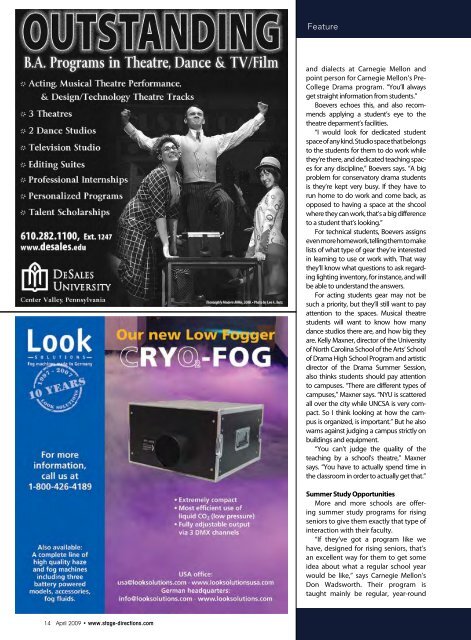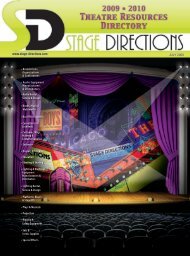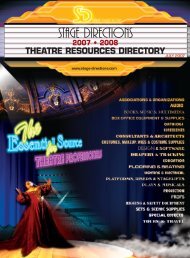Download a PDF - Stage Directions Magazine
Download a PDF - Stage Directions Magazine
Download a PDF - Stage Directions Magazine
Create successful ePaper yourself
Turn your PDF publications into a flip-book with our unique Google optimized e-Paper software.
Feature<br />
and dialects at Carnegie Mellon and<br />
point person for Carnegie Mellon’s Pre-<br />
College Drama program. “You’ll always<br />
get straight information from students.”<br />
Boevers echoes this, and also recommends<br />
applying a student’s eye to the<br />
theatre deparment’s facilities.<br />
“I would look for dedicated student<br />
space of any kind. Studio space that belongs<br />
to the students for them to do work while<br />
they’re there, and dedicated teaching spaces<br />
for any discipline,” Boevers says. “A big<br />
problem for conservatory drama students<br />
is they’re kept very busy. If they have to<br />
run home to do work and come back, as<br />
opposed to having a space at the shcool<br />
where they can work, that’s a big difference<br />
to a student that’s looking.”<br />
For technical students, Boevers assigns<br />
even more homework, telling them to make<br />
lists of what type of gear they’re interested<br />
in learning to use or work with. That way<br />
they’ll know what questions to ask regarding<br />
lighting inventory, for instance, and will<br />
be able to understand the answers.<br />
For acting students gear may not be<br />
such a priority, but they’ll still want to pay<br />
attention to the spaces. Musical theatre<br />
students will want to know how many<br />
dance studios there are, and how big they<br />
are. Kelly Maxner, director of the University<br />
of North Carolina School of the Arts’ School<br />
of Drama High School Program and artistic<br />
director of the Drama Summer Session,<br />
also thinks students should pay attention<br />
to campuses. “There are different types of<br />
campuses,” Maxner says. “NYU is scattered<br />
all over the city while UNCSA is very compact.<br />
So I think looking at how the campus<br />
is organized, is important.” But he also<br />
warns against judging a campus strictly on<br />
buildings and equipment.<br />
“You can’t judge the quality of the<br />
teaching by a school’s theatre,” Maxner<br />
says. “You have to actually spend time in<br />
the classroom in order to actually get that.”<br />
Summer Study Opportunities<br />
More and more schools are offering<br />
summer study programs for rising<br />
seniors to give them exactly that type of<br />
interaction with their faculty.<br />
“If they’ve got a program like we<br />
have, designed for rising seniors, that’s<br />
an excellent way for them to get some<br />
idea about what a regular school year<br />
would be like,” says Carnegie Mellon’s<br />
Don Wadsworth. Their program is<br />
taught mainly be regular, year-round<br />
14 April 2009 • www.stage-directions.com

















